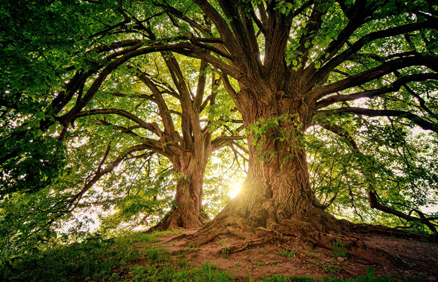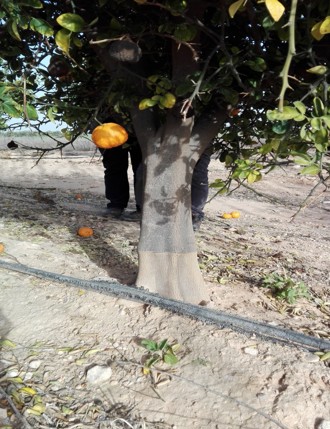Parashat Tazria: Birkat Ha'ilanot, the Blessing for the Trees

Can we say birkat ha'ilanot over trees grafted in a prohibited fashion? What about orlah trees? An article all about this special mitzvah that we do once a year in the Spring.
This Shabbat, Rosh Chodesh Nissan (5779), is our first opportunity to say birkat ha'ilanot,
the blessing for the trees:
,[בָּרוּךְ אַתָּה ה', אֱלֹקֵֽינוּ מֶלֶךְ הָעוֹלָם, שֶׁלֹּא חִסֵּר בְּעוֹלָמוֹ דָבָר [או: כְּלוּם
.וּבָרָא בוֹ בְּרִיוֹת טוֹבוֹת וְאִילָנוֹת טוֹבים, לֵהָנוֹת בָּהֶם בְּנֵי אָדָם
"Blessed are You, G-d, our L-rd, king of the Universe, who did not Who has withheld nothing from His world, and has created in it beautiful creatures and trees for human beings to enjoy."
The ideal time to say birkat ha'ilanot is during the month of Nissan. Since we should do mitzvot with alacrity and since it's best to do this mitzvah in a large gathering, the custom is for the congregation to say the blessing as a group immediately following musaf on the first Shabbat of Nissan—this Shabbat.
The Shulchan Aruch (OC 226:1) writes, based on the Gemara in tractate Berachot:
"One who goes out in the days of Nissan and sees trees giving forth blossoms, says: Blessed are you … …."; this blessing should only be recited once every year; if late to recite this blessing [and only remembering to say it] when the fruit grew, this blessing may no longer be recited."
That is: we should say the blessing when we see the trees blossoming (before they turn into fruit); it is best to say this blessing on two adjacent trees.
We make this blessing on trees that benefit mankind. For this reason, the poskim write that we are supposed to say birkat ha'ilanot on fruit trees only, not on those that do not bear fruit (despite the fact that we say the blessing before fruit begins to form).
What about trees whose fruits are forbidden or trees cultivated in a forbidden manner?
Is it possible to say birkat ha'ilanot on grafted trees?

A grafted citrus tree.
It's possible to clearly see the place of the graft: the trunk above and below the graft are different colors.
Photograph by Rabbi Moshe Bloom
One of the prohibitions of kila'im, forbidden mixtures, is called kilei ilan, grafting. It is forbidden to graft a tree of one species onto a tree of another species. This mitzvah not only applies in the Land of Israel, but is also incumbent on those living abroad. Moreover, according to most poskim, it is not only forbidden to perform the actual act of forbidden grafting; it is also forbidden to plant such grafted trees and even to maintain and cultivate them (watering, fertilizing, etc.).
The Shulchan Aruch (YD §295:2) rules that it is forbidden for a Jew to commission a non-Jew to perform a forbidden graft.
What about the fruit of trees grafted in a forbidden manner?
While it is forbidden to sustain a tree grafted in a forbidden manner, its fruits are permissible to eat—even to those who transgressed the prohibition of kilei ilan and performed the forbidden graft. Likewise, it is permitted to take a shoot from such trees and plant it elsewhere (Shulchan Aruch, ibid., 7). That is: despite the fact that we are not allowed to graft different species of trees to one another, plant them, or sustain them, if we did so anyway we may still the fruit of the tree.
The poskim are divided on whether it is permissible to say birkat ha'ilanot over a tree that is known to have been grafted in a forbidden manner.
The first to address the issue of reciting blessings over trees grafted in a prohibited fashion is Rabbi Ya'akov Chagiz (Morocco-Italy-Israel, 17th century) in his book Halachot Ketanot (1:60). He rules that one should not make a shehechiyanu on a tree grafted in a prohibited fashion: "Since anything that people do against the will of the Creator—how can one say shehechiyanu upon seeing such a thing?" There are poskim who say that this would not be so if the one who performed the graft was gentile, as kilei ilan is not included in the seven Noahide mitzvot, so this would not be a prohibited act for them. However, there is a Tanaitic dispute about the status of kilei ilan vis-à-vis gentiles; Rambam holds that even gentiles may not perform forbidden grafts!
Rabbi Yosef Chaim, the Ben Ish Chai (19th-20th century Bagdad, Rav Pe'alim OC 2:36) forbids saying birkat ha'ilanot on trees grafted in a forbidden manner. Rabbi Ovadia Yossef likewise is stringent in the matter (Yabiya Omer V OC §20) .
Rabbi Yitzchak Yaakov Weiss, author of the Minchat Yitzchak (1902-1989, Galicia-England-Israel) on 20 Shevat 5721 (February 3, 1960), when serving as the Rabbi of Manchester, wrote a responsum to Rabbi Krauss of Melbourne (Minchat Yitzchak 3:25). There he wrote that to avoid halachic uncertainty, it is best to say birkat ha'ilanot on non-grafted trees. The rationale is that it is improper to derive benefit from and thank G-d for something created through sin.
Nevertheless, there are rabbis who are lenient in the matter for various reasons.
In practice: if one knows with certainty that a particular tree was grafted in a prohibited fashion, even if performed by a non-Jew outside of Israel, one should be stringent and not recite birkat ha'ilanot on the tree. Only when there is uncertainty about the matter it would be permitted to recite this blessing. Of course it is preferable to find out this information, if easily accessible, by asking an agronomist if a certain tree is grafted; and if so, what the scion-strockroot combination is. Even if the tree is grafted (like in the picture above), there are many permitted grafts when similar species are grafted onto one another (min bemino; as opposed to different species, min beshe-eino mino, which is forbidden). For a comprehensive list of common permissible and forbidden scion-stock root combinations, click here.
Is it possible to say birkat ha'ilanot on an orlah tree?
Rabbi Akiva Eger (18th-19th century, Europe, Shulchan Aruch OC §226) expresses uncertainly whether one may say birkat ha'ilanot on a tree within its first three years of growth, when it has the status of orlah. This is because at this stage, it is forbidden to derive any benefit from the fruit. He permits saying the blessing, however, when there is a doubt regarding a tree's orlah status (safek orlah).
In practice, here too, modern poskim tend to forbid saying birkat ha'ilanot on orlah trees, even outside of Israel (since the fruits of trees that are certainly orlah are forbidden even outside the Land of Israel). In cases of doubt, though, they permit this.




